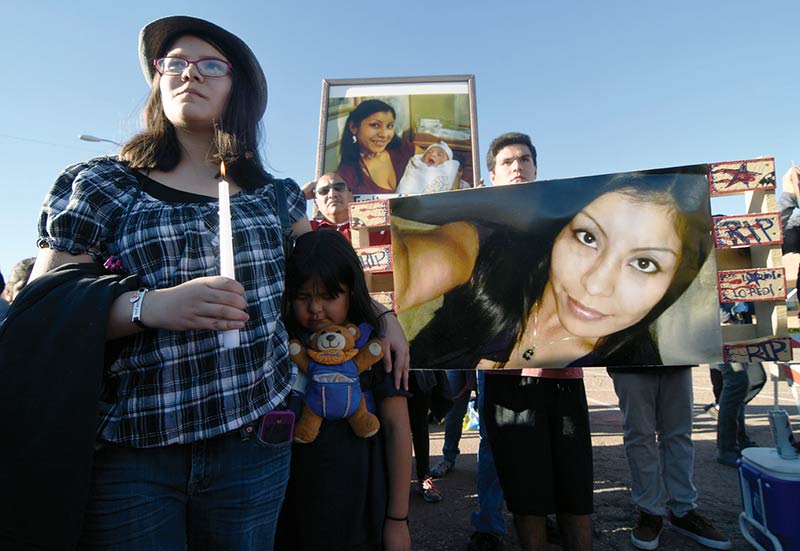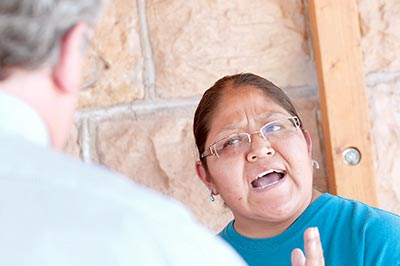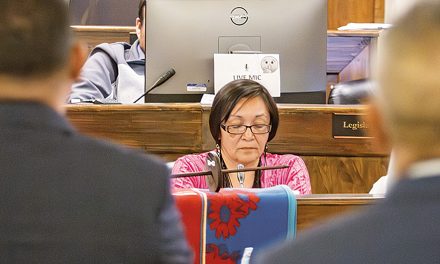
Tsingine family confronts Winslow

Navajo Times | Donovan Quintero Analese Burrola, 14, holds a candle during a candlelight vigil for Loreal Tsginine Saturday in Winslow.
TEESTO, Ariz.
A little too late.
That is what Floranda Dempsey, the aunt of Loreal Tsingine, said about Winslow City Manager Steve Pauken’s and Winslow Police Chief Stephen Garnett’s visit to Tsingine’s home chapter of Teesto on Tuesday.

Navajo Times | Donovan Quintero
Aunt of Loreal Tsingine, Floranda Dempsey, speaks to Winslow City Manager Steve Pauken Tuesday after a meeting at the Teesto Chapter House in Teesto, Ariz. Dempsey told Pauken her and her family did not appreciate not being acknowleged by him and Winslow Police Department Chief Stephen Garnett.
Pauken and Garnett each gave an update on the status of the investigation into Tsingine’s Easter Sunday shooting death at the hands of a Winslow Police officer and what else the city and police department would be doing over the next year.
Both city officials explained to Teesto Chapter members during a May 13 chapter meeting in Dilkon, Arizona, that the city and the police department had no idea what the Arizona of Public Safety’s completed investigation report concluded – whether or not Winslow police officer Austin Shipley was found to be justified justified in fatally shooting Tsingine on March 27.
“I want you to know as a community people of Winslow, the people and council of Winslow feel a great sense of loss,” Pauken said at the chapter meeting.
A family member of Tsingine interrupted him and said, “No, you don’t.” Pauken continued that the city was prepared for “a very long, arduous process over the next year,” and would have the Mesa, Arizona, Police Department assess the Winslow Police Department after Maricopa County’s final review of the DPS report and recommendations.
He added that officials from the U.S. Department of Justice would also be conducting an assessment of the police department and make further recommendations on improving its policies.
Garnett repeated what the city manager stated and said that the shooting was a very tragic event that had impacted the whole city, as well as his officers. Garnett acknowledged his police department had the Navajo Nation Human Rights Commission conduct a class on cultural diversity two years ago for his officers to address some of the cultural differences between the Winslow police and the Navajo Nation.
Garnett continued that the department and its officers took their jobs seriously to protect, even feed or clothe, the Navajo men and women who within their jurisdiction.
“Just the other day, I got up early in the morning,” Garnett said, explaining his experience with a Navajo woman. “She was laying on my doorstep, and I woke her up and we talked. And I asked her what was going on and she said she came from the community of Dilkon and her husband was in the hospital.”
“I said, ‘Let’s sit and talk, see if we can get to some of the issues you’re having,’” Garnett continued. “So, we went to breakfast together. I took her to the hospital to meet with her family. These are the kind of things we do that no one knows we do.”
As Garnett explained the kind of police officers Winslow had, a family member of Tsingine spoke up and asked why he didn’t do that for Tsingine.
Another family member asked when they were going to get an apology from him and the city.
“From my heart I share this with you, if you knew the pain that we go through every night,” Garnett responded. “You don’t know the pain that we go through, the pain the officers go through. I have prayed over this city and I prayed over the community for help. I don’t have an answer, yet, why it happened.”
After Garnett’s talk, Teesto Chapter President Elmer Clark reminded both city officials that Tsingine’s family was still hurt and grief-stricken and they should understand.
“Her bloodline is from here, her heritage, aunties, uncles, are all from here,” Clark said. “That’s why you have to understand. That’s why I have to allow them to air out their hurt. Understand that.”
Clark added that if the report at least condemned the shooting and the killing, it would serve some purpose. Clark thanked the men for their visit and also for their planned future visits to Leupp and Tolani Lake chapters.
After the meeting was concluded, Pauken and Garnett shook hands with each chapter official before walking out, not acknowledging Tsingine’s family as they exited.
Dempsey confronted Pauken outside the chapter house afterward, saying the police department should have first apologized to the family, instead of apologizing to chapter officials and community members.
“We never got an apology,” Dempsey said to Pauken. “You have the guts to talk to the media, but you don’t come to us. Nobody has come to apologize to us. You people need to understand that.”
“And Stephen Garnett, where the hell did he go?” Alta Barnell, a cousin of Tsingine who later joined Dempsey, chimed in. “The whole time he was talking, he didn’t even look at us.”
Pauken listened and said he agreed that they’d be in touch with the family and thanked them and walked to his vehicle where Garnett waited.
“You better darned well be,” Dempsey said.
The family continues to hold candlelight vigils from 5 p.m. to 6 p.m. on the 27th of every month for Tsginine, at the location where she was shot and killed.
To read the full article, pick up your copy of the Navajo Times at your nearest newsstand Thursday mornings!
Are you a digital subscriber? Read the most recent three weeks of stories by logging in to your online account.








 Highway 264,
Highway 264, I-40, WB @ Winslow
I-40, WB @ Winslow